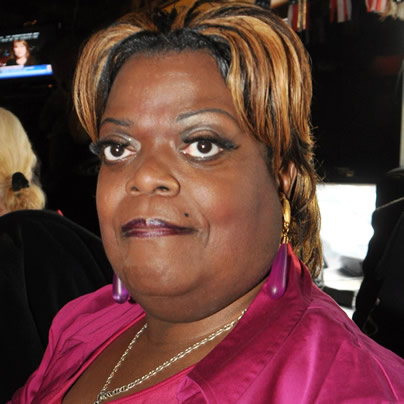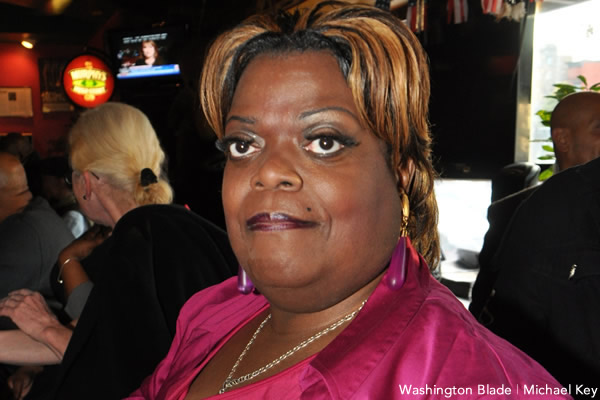Local
Trans group struggles with financial crisis
T.H.E. hit by IRS tax liens, possible suspension of city funds


Longtime activist Earline Budd is reportedly among THE staffers experiencing problems getting paid. (Blade file photo by Michael Key)
Transgender Health Empowerment, a non-profit group that has provided a wide range of services for D.C.’s transgender community for more than a decade, is struggling with a financial crisis that has prevented it from paying its employees on time and has triggered staff layoffs and resignations, according to multiple sources familiar with the organization.
Public records at the D.C. Recorder of Deeds office show that the IRS filed at least 10 liens against THE over the past three-and-a-half years. Most are due to THE’s failure to pay employee payroll taxes, the records show.
Sources familiar with the situation say the liens prompted the D.C. Department of Health to suspend some or all of its funding for THE for HIV/AIDS-related services. The funding suspension reportedly was triggered by a procurement rule that restricts city funding for vendors or contractors that are in violation of the law, including federal tax law, the sources said.
A former THE employee and current client said they each were told by THE staffers that a delay in city funding forced the group to cut back on its drop-in services at its headquarters at 1414 North Capitol Street, N.W., and to limit services to clients by appointment only.
“The whole month of March we didn’t get a paycheck,” said the former employee, who was laid off in April because of THE’s financial problems, the former employee told the Blade.
Among THE employees not getting paid or getting paid late are THE official and longtime transgender activist Earline Budd, THE Director of Programs Brian Watson, and transgender activist Jeri Hughes, sources familiar with the group said.
Top officials with THE and the Department of Health have not responded to repeated requests by the Blade for information about the cause of THE’s financial problems and the status of city funding for the group.
“At this particular time, there’s no comment,” Brian Devine, THE’s finance manager, told the Blade. Devine said THE Executive Director Anthony Hall also had no comment.
“We just had a board meeting and that was one of the issues we spoke of,” said Devine, adding that the board decided not to issue a statement about the situation at the present time.
DOH spokesperson Najma Roberts said she would make inquiries about the THE funding status when contacted by the Blade last week. As of press time this week she had not responded.
The Blade filed a Freedom of Information Act request with the DOH deputy general counsel, Phillip Husband, on April 3 seeking the information that the department has yet to release through Roberts, the press spokesperson. Husband said the department usually takes up to 15 business days to respond to a FOIA request.
“My biggest concern is THE’s clients,” said transgender activist Ruby Corado, director of Casa Ruby, an LGBT community center in Columbia Heights that caters to the Latino and transgender communities.
Corado said some of THE’s clients have been coming to Casa Ruby after being told that THE’s drop in center had curtailed its services.
Corado and other transgender activists called THE the D.C. area’s preeminent service provider and advocate for the transgender community.
They note that THE also operates the city’s only housing facility dedicated to homeless LGBT youth. The facility known as the Wanda Alston House has been nationally recognized as an innovative resource for LGBT youth that offers counseling, employment and vocational training, and other services.
Among THE programs funded by DOH is its highly acclaimed Comprehensive Risk Counseling Services or CRSC program, which offers risk reduction interventions for preventing HIV infection among transgender people, especially transgender women, whom experts say are at high risk for HIV. THE also offers HIV testing and counseling.
“THE is a transgender institution for D.C.,” Corado said. “There are a lot of people counting on its services, especially those living with HIV. It is an organization that cannot go away,” she said.
“So the question I have is what is the Department of Health doing about this,” Corado said. “Why aren’t they talking about what happens to those clients? Are those clients OK?”
Transgender activist Alexandra Beninda, who serves on the D.C. Human Rights Commission, was among those who praised THE for its work in the transgender community but said she was unaware that the group was having financial problems.
She said she hoped the community would rally in support of THE but expressed concern that news of the group’s problems had not gotten out to those who might be willing to help.
Mara Keisling, executive director of the D.C.-based National Center for Transgender Equality, said she, too, was unaware of the THE financial problems.
“They are the centerpiece for local transgender efforts,” Keisling said.
Records of the IRS liens against THE filed with the D.C. Recorder of Deeds show that between March 2010 and earlier this year the group owed the IRS a total of $260,075. The records don’t show how much of that amount was for unpaid taxes and how much, if any, was for interest and penalties.
The records show that THE has since made payments of $91,912 to pay off the back taxes and currently owes the IRS $168,163.
As a non-profit, tax-exempt organization, THE doesn’t pay taxes on its income from donors or from government grants and contracts. The records indicate that most of the money owed is for employee payroll taxes.
Due to THE’s refusal to comment on the matter it couldn’t immediately be determined what caused the underlying financial problems that prevented THE from paying its employee payroll taxes.
Ron Simmons, executive director of the D.C. AIDS service group Us Helping Us, which also receives city funding, said smaller community based groups like THE sometimes encounter cash flow problems when the city takes too long to reimburse the group for its services. He said DOH in the past has taken 90 days or longer to reimburse vendors and service providers.
“Among other things, they are the only LGBT homeless shelter for youth,” Simmons said. “We absolutely can’t let them go under,” he said of THE.
THE’s most recently filed IRS 990 finance report that is available for public viewing is for the fiscal year of Oct. 1, 2009 through Sept. 30, 2010.
The report shows that THE’s income for the year was $960,834 and its expenses came to $1,093,816, with a deficit of $132,982.
District of Columbia
D.C. Black Pride theme, performers announced at ‘Speakeasy’
Durand Bernarr to headline 2026 programming

The Center for Black Equity held its 2026 DC Black Pride Theme Reveal event at Union Stage on Monday. The evening, a “Speakeasy Happy Hour,” was hosted by Anthony Oakes and featured performances by Lolita Leopard and Keith Angelo. The Center for Black Equity organizes DC Black Pride.
Kenya Hutton, Center for Black Equity president and CEO, spoke following the performances by Leopard and Angelo. Hutton announced this year’s theme for DC Black Pride: “New Black Renaissance.”
Performers for 2026 DC Black Pride were announced to be Bang Garcon, Be Steadwell, Jay Columbus, Bennu Byrd, Rue Pratt and Akeem Woods.
Singer-songwriter Durand Bernarr was announced as the headliner for the 2026 festivities. Bernerr gave brief remarks through a video played on the screen at the stage.
DC Black Pride is scheduled for May 22-25. For more information on DC Black Pride, visit dcblackpride.org.
Virginia
Arlington LGBTQ bar Freddie’s celebrates 25th anniversary
Owner asks public to support D.C.-area gay bars

An overflowing crowd turned out Sunday night, March 1, for the 25th anniversary celebration of Freddie’s Beach Bar, the LGBTQ bar and restaurant located in the Crystal City section of Arlington, Va.
The celebration began as longtime patrons sitting at tables and at the bar ordered drinks, snacks, and full meals as several of Freddie’s well-known drag queens performed on a decorated stage.
Roland Watkins, an official with Equality NoVa, an LGBTQ advocacy organization based in the Northern Virginia areas of Arlington, Alexandria, and Fairfax County, next told the gathering about the history of Freddie’s Beach Bar and the role he said that owner Freddie Lutz has played in broadening the bar’s role into a community gathering place.
“Twenty-five years ago, opening a gay bar in Arlington was not a given,” Watkins told the crowd from the stage. “It took courage, convincing, and a deep belief that our community belongs openly, visibly, and proudly,” he said. “And that belief came from Freddie.”
Watkins and others familiar with Freddie’s noted that under Lutz’s leadership and support from his staff, Freddie’s provided support and a gathering place for LGBTQ organizations and a place where Virginia elected officials, and candidates running for public office, came to express their support for the LGBTQ community.
“Over the past 25 years, Freddie’s has become more than a bar,” Watkins said. “It has become a community maker.”
Lutz, who spoke next, said he was moved by the outpouring of support from long-time customers. “Thank you all so much for coming tonight and thank you all so much for your support over the past 25 years,” he said. “I can’t tell you how much that means to me and how much it’s kept me going.”
But Lutz then said Freddie’s, like many other D.C. area gay bars, continues to face economic hard times that he said began during the COVID pandemic. He noted that fewer customers are coming to Freddie’s in recent years, with a significant drop in patronage for his once lucrative weekend buffet brunches.
“So, I don’t want to be the daddy downer on my 25-year anniversary,” he said. “But this was actually the worst year we’ve ever had,” he added. “And I guess what I’m asking is please help us out. Not just me, but all the gay bars in the area.” He added, “I’m reaching out and I’m appealing to you not to forget the gay bars.”
Lutz received loud, prolonged applause, with many customers hugging him as he walked off the stage.

In an official statement released at the reveal event Capital Pride Alliance described its just announced 2026 Pride theme of “Exist, Resist, Have the Audacity” as a “bold declaration affirming the presence, resilience, and courage of LGBTQ+ people around the world.”
The statement adds, “Grounded in the undeniable truth that our existence is not up for debate, this year’s theme calls on the community to live loudly and proudly, stand firm against injustice and erasure, and embody the collective strength that has always defined the LGBTQ+ community.”
In a reference to the impact of the hostile political climate, the statement says, “In a time when LGBTQ+ rights and history continue to face challenges, especially in our Nation’s Capital, where policy and public discourse shape the future of our country, together, we must ensure that our voices are visible, heard, and unapologetically centered.”
The statement also quotes Capital Pride Alliance CEO and President Ryan Bos’s message at the Reveal event: “This year’s theme is both a declaration and a demand,” Bos said. “Exist, Resist, Have Audacity! reflects the resilience of our community and our responsibility to protect the progress we’ve made. As we look toward our nation’s 250th anniversary, we affirm that LGBTQ+ people have always been and always will be part of the United States’s history, and we will continue shaping its future with strength and resolve,” he concluded.
-

 District of Columbia5 days ago
District of Columbia5 days agoCapital Pride board member resigns, alleges failure to address ‘sexual misconduct’
-

 India4 days ago
India4 days agoActivists push for better counting of transgender Indians in 2026 Census
-

 Advice4 days ago
Advice4 days agoDry January has isolated me from my friends
-

 District of Columbia4 days ago
District of Columbia4 days agoCapital Pride reveals 2026 theme


















